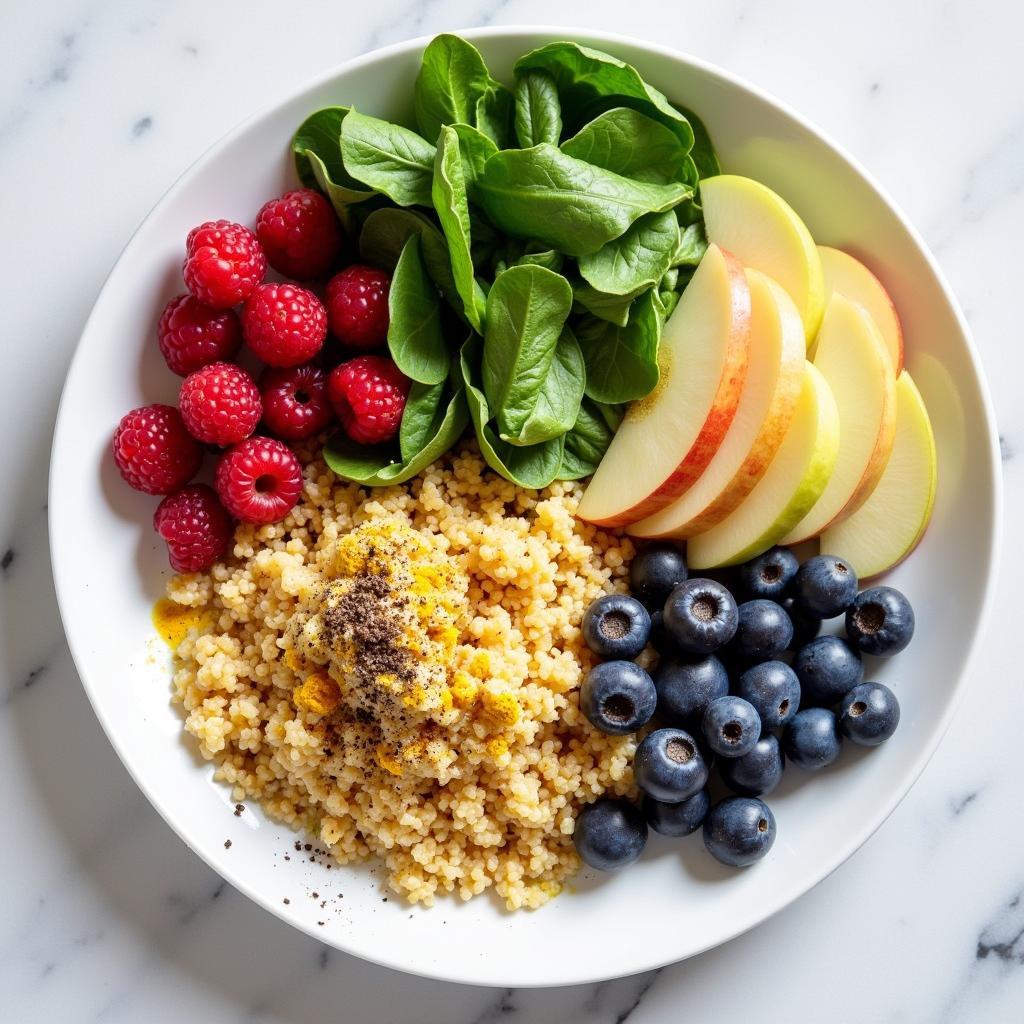Ayurvedic Foods For Kapha are designed to balance the earth and water elements within this dosha. Kapha is characterized by stability, strength, and a nurturing nature. However, an imbalance can lead to weight gain, lethargy, and congestion. By understanding the principles of Ayurveda and incorporating specific foods into your diet, you can maintain a healthy kapha balance and experience optimal well-being.
Understanding Kapha Dosha and Its Influence on Diet
Kapha dosha, composed of earth and water elements, governs structure and lubrication in the body. When in balance, Kapha individuals are typically calm, grounded, and compassionate. However, an excess of Kapha can manifest as sluggishness, weight gain, difficulty waking up, and a tendency towards emotional stagnation. The key to managing Kapha is to incorporate ayurvedic foods for kapha that promote lightness, warmth, and stimulation. This means favoring foods that are pungent, bitter, and astringent, while minimizing those that are heavy, sweet, and oily.
After this initial discovery of what Kapha is, many individuals wonder about specific dietary recommendations. You can find helpful information on our kapha food list page.
Best Ayurvedic Foods for Kapha
Choosing the right foods is crucial for balancing Kapha. Light, dry, and warm foods are ideal, as they counteract Kapha’s heavy, cold, and moist qualities. Incorporate plenty of fruits and vegetables like apples, berries, leafy greens, and cruciferous vegetables. Spices like ginger, turmeric, black pepper, and cinnamon can also help to stimulate digestion and metabolism.
Here are some examples of Kapha-balancing foods:
- Fruits: Apples, pears, cranberries, pomegranates
- Vegetables: Leafy greens, broccoli, cauliflower, Brussels sprouts, asparagus
- Grains: Barley, quinoa, millet
- Legumes: Lentils (in moderation)
- Spices: Ginger, turmeric, black pepper, cinnamon, cumin
 Kapha Balancing Foods: A colorful plate of fruits, vegetables, and grains.
Kapha Balancing Foods: A colorful plate of fruits, vegetables, and grains.
Foods to Avoid for Kapha
Certain foods can exacerbate Kapha imbalances. Heavy, oily, and sweet foods should be minimized. This includes dairy products, red meat, processed foods, refined sugars, and excessive nuts and seeds. Limiting these foods helps prevent sluggishness and weight gain often associated with excess Kapha.
Foods to avoid include:
- Dairy: Cheese, yogurt, milk (except in small amounts)
- Meats: Red meat, pork
- Sweets: Refined sugar, sugary drinks, desserts
- Oils: Excessive use of heavy oils like coconut oil
You might find it challenging to navigate the various foods to avoid, so for a comprehensive guide, refer to our kapha diet food list.
What are some sample meal ideas for balancing Kapha?
Sample meals for balancing Kapha might include a light breakfast of spiced cooked apples with quinoa, a lunch of lentil soup with plenty of vegetables, and a dinner of roasted vegetables with a small portion of baked fish.
How can spices benefit a Kapha-balancing diet?
Spices are essential for a Kapha-balancing diet because they stimulate digestion and metabolism, which can be sluggish in Kapha individuals. Spices like ginger, black pepper, and cayenne pepper help to increase digestive fire (agni) and improve circulation.
“Incorporating warming spices like ginger and black pepper into your meals can be transformative for Kapha,” says Dr. Anjali Sharma, a renowned Ayurvedic practitioner. “These spices help to ignite digestive fire and counteract the heavy, cold nature of Kapha.”
Tips for Maintaining a Kapha-Balancing Diet
Sticking to a Kapha-balancing diet requires conscious effort and lifestyle adjustments. Regular exercise, adequate sleep, and stress management are essential. These practices support overall well-being and help to keep Kapha in check. For insights into balancing a different dosha, consider exploring our resources on foods to balance vata.
 Lifestyle Tips for Balancing Kapha: Images depicting exercise, mindful eating, and restful sleep.
Lifestyle Tips for Balancing Kapha: Images depicting exercise, mindful eating, and restful sleep.
“A balanced lifestyle is crucial for maintaining Kapha balance,” adds Dr. Sharma. “Regular exercise, proper sleep, and stress-reducing activities are just as important as the foods you eat.”
Conclusion
Balancing your Kapha dosha with ayurvedic foods for kapha involves understanding your unique constitution and making mindful food choices. By embracing a diet rich in light, warm, and stimulating foods, and avoiding heavy, cold, and oily foods, you can maintain a healthy Kapha balance and enhance your overall well-being. Remember that incorporating lifestyle practices like exercise and stress management is key to maximizing the benefits of an Ayurvedic approach to Kapha. Are you interested in learning more about what foods to avoid for Vata dosha? Check out our guide on vata food list to avoid.
FAQ
- What are the main characteristics of Kapha dosha?
- What are some common signs of a Kapha imbalance?
- Can I eat dairy products if I have a Kapha imbalance?
- What spices are best for balancing Kapha?
- What lifestyle changes can I make to support a Kapha-balancing diet?
- How can I determine my dominant dosha?
- Are there any specific recipes for Kapha-balancing meals?
Common Scenarios and Questions
- Scenario: Feeling sluggish and experiencing weight gain.
- Question: What foods should I avoid to reduce Kapha?
- Scenario: Difficulty waking up in the morning.
- Question: What foods can help me feel more energized?
- Scenario: Experiencing congestion and excess mucus.
- Question: What foods can help to dry out excess Kapha?
Further Exploration
For further information, explore our other articles on Ayurvedic nutrition and dosha balancing. You might be interested in learning more about Vata and Pitta doshas and their corresponding dietary recommendations.
Contact Us
When you need assistance, please contact us by Phone: 02437655121, Email: minacones@gmail.com Or visit our address: 3PGH+8R9, ĐT70A, thôn Trung, Bắc Từ Liêm, Hà Nội, Việt Nam. We have a 24/7 customer care team.